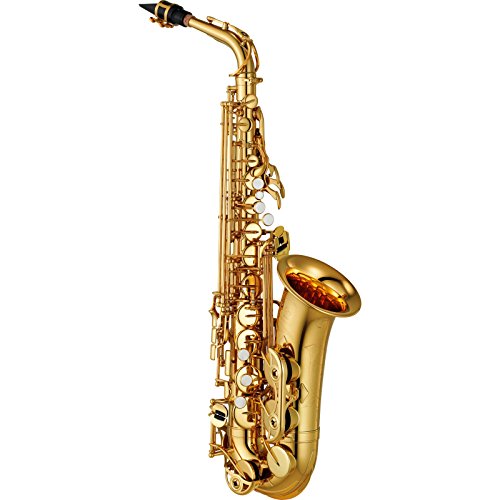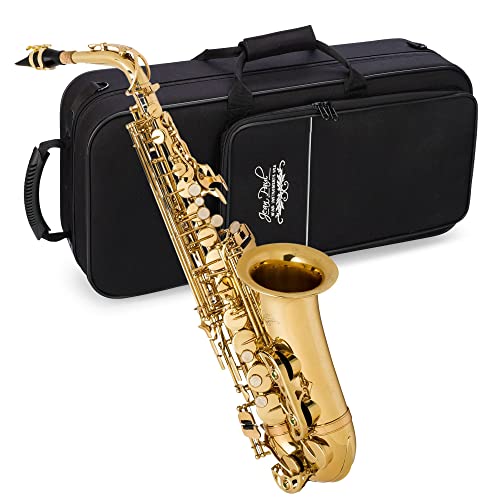There comes a moment in every developing saxophonist’s journey where the instrument that got them started begins to feel less like a tool and more like a barrier. I remember it vividly. The student model horn that once felt so capable suddenly couldn’t keep up. The tone felt thin in the upper register, the low notes were stuffy and hard to control, and the key action felt sluggish under increasingly complex fingerings. This is the plateau—the point where your musical ideas outpace your instrument’s capabilities. It’s a frustrating place to be, and without the right upgrade, it can stifle growth and passion. The search for an “intermediate” saxophone isn’t just about buying a new piece of gear; it’s about finding a partner that can unlock the next level of your musical expression, one that responds to nuance and rewards practice with a truly beautiful sound.
- Yamaha Intermediate Model Alto Saxophone -- Key of Eb
- Epoxy Lacquer Finish on Body & Keys -- Front F & High F# Key -- 62 Style Neck
What to Consider Before Investing in an Intermediate Saxophone
An intermediate saxophone is more than just an item; it’s a key solution for a musician’s growth. It represents a significant commitment to the craft, bridging the crucial gap between a basic beginner model and a high-end professional horn. The main benefit is gaining access to features that encourage better technique, tone production, and intonation without the prohibitive cost of a custom-grade instrument. These instruments solve the problem of a student horn’s limitations, offering a richer tonal palette, more responsive keywork, and superior build quality that can withstand years of dedicated practice and performance. For the aspiring player, it’s the tool that makes advanced techniques not just possible, but intuitive.
The ideal customer for this type of product is someone facing the limitations of their entry-level instrument. This includes the dedicated middle or high school band student, the adult amateur who has returned to the instrument with serious intent, or even a professional woodwind player looking for a reliable and great-sounding doubling horn. They’ve put in the hours and need an instrument that will grow with them for the next five to ten years. Conversely, this might not be the right choice for an absolute beginner. The higher cost and more sensitive response could be overwhelming for someone who isn’t yet sure of their commitment. For those individuals, a comprehensive beginner kit might be a more practical starting point. Likewise, a seasoned professional performing at the highest level may require the specific refinements and customization options found only in top-tier professional models.
Before investing, consider these crucial points in detail:
- Ergonomics & Feel: How the saxophone feels in your hands is paramount. Look for comfortable key placement that fits your hand size, and consider features like an adjustable thumb rest. The weight and balance of the horn will also affect playing comfort during long practice sessions. A well-designed instrument should feel like a natural extension of your body, not something you have to fight against.
- Acoustic Performance & Intonation: This is the soul of the instrument. A good intermediate horn should have a consistent, centered tone across all registers, from the lowest Bb to the altissimo range. Pay close attention to intonation—the saxophone’s ability to play in tune with itself. Yamahas are renowned for their excellent intonation, which is crucial for playing in ensembles.
- Materials & Build Quality: Most saxophones are made of yellow brass, but the quality of construction makes all the difference. Look for strong, durable keywork, quality pads that seal properly, and a resilient finish like the epoxy lacquer on the Yamaha YAS-480 Eb Alto Saxophone. Details like separate key guards and tapered pivot screws indicate a higher level of craftsmanship and longevity.
- Included Accessories & Maintenance: Consider what comes with the horn. A sturdy, protective case is essential, and the quality of the included mouthpiece can significantly impact the initial playing experience. Understand that a quality instrument is an investment that requires regular maintenance—plan for periodic check-ups with a qualified repair technician to keep it in optimal playing condition.
Making the leap to an intermediate saxophone is a major step. By carefully considering these factors, you can choose an instrument that will not only meet your current needs but also inspire you for years to come.
While the Yamaha YAS-480 Eb Alto Saxophone is an excellent choice, it’s always wise to see how it stacks up against the competition. For a broader look at all the top models, we highly recommend checking out our complete, in-depth guide:
- Complete with Case
- Perfect for Beginners: The WUQIMUSC Alto Saxophone is designed specifically for students and...
- Beautiful Sound - professional tone adjustment before leaving factory, excellent sound quality...
Unboxing the Yamaha YAS-480: First Impressions and Key Features
There’s a certain anticipation that comes with unboxing a high-quality instrument, and the Yamaha YAS-480 Eb Alto Saxophone did not disappoint. Echoing the sentiments of several users who noted the excellent packaging, our horn arrived securely double-boxed, ensuring it was in pristine condition. Opening the sturdy, well-padded case revealed the instrument itself, gleaming with its gold epoxy lacquer finish. The first thing we noticed was the substantial feel—it has a satisfying heft that speaks to its quality construction, a clear step up from lighter student models. The hand-engraved bell is a beautiful, professional touch that adds a sense of pride in ownership. Upon assembling the 62-style neck, the fit was snug and precise, with no wobble. A quick inspection of the keywork revealed perfectly seated pads and a snappy, responsive action right out of the box. It feels and looks like what it is: a serious instrument designed for serious players. The package includes the horn, neck, a Yamaha 4C mouthpiece (a fantastic and versatile standard), a ligature, cap, neck strap, and cork grease, providing everything needed to play immediately. You can immediately see the complete feature set and appreciate the attention to detail Yamaha provides.
What We Like
- Superb tonal consistency and excellent intonation across all registers
- Professional-grade features like the 62-style neck and High F# key
- Ergonomic and responsive keywork that facilitates advanced technique
- Exceptional Yamaha build quality and durability for long-term value
Drawbacks
- Higher price point than many other student/intermediate horns
- The included 4C mouthpiece, while excellent, may be outgrown by advancing players
A Deep Dive into the Yamaha YAS-480 Eb Alto Saxophone’s Performance
An instrument can look stunning and have an impressive feature list, but the true test happens when air passes through it. This is where the Yamaha YAS-480 Eb Alto Saxophone truly distinguishes itself, moving beyond the specifications on paper to become a wonderfully expressive musical tool. We spent extensive time putting this saxophone through its paces, from long tones and scales to intricate classical etudes and improvisational jazz lines. Our in-depth evaluation focused on the core elements that define a great “step-up” horn: its voice, its feel, its construction, and its reliability.
Tonal Quality and Responsiveness – The Yamaha Voice
The first thing that struck us was the richness and complexity of the tone. The YAS-480 produces a sound that is warm, centered, and incredibly versatile. In the low register, notes speak clearly and with authority, avoiding the stuffiness that plagues many lesser instruments. We could easily produce a gentle, breathy subtone on a low C or a powerful, resonant fortissimo on a low Bb. This control is empowering for a developing player. As we moved into the mid and upper registers, this consistency continued. The sound remains full and vibrant, never becoming thin or shrill, even when pushed. A large part of this sonic character comes from the included 62-style neck. Based on Yamaha’s legendary professional models, this neck design promotes a slightly more focused and responsive feel, giving players a taste of a professional horn’s performance. It allows for a remarkable degree of expressiveness, capable of a bright, cutting tone for jazz and funk or a dark, classical sound with a simple change in embouchure and mouthpiece. The horn responds instantly to the player’s input, making it feel less like you’re playing an instrument and more like you’re singing through it. This immediate feedback loop is crucial for developing a sophisticated tonal concept, a feature that really sets it apart in the intermediate market.
Ergonomics and Keywork – An Extension of Your Hands
If the tone is the saxophone’s voice, the keywork is its vocabulary. The ergonomics of the YAS-480 are exceptional, designed to make playing feel natural and effortless. The key layout is comfortable and intuitive, and our hands fell into a natural playing position immediately. Yamaha has incorporated several key mechanical upgrades that are typically found on more expensive models. The redesigned octave key system provides a smoother, quicker transition between octaves, which is especially noticeable during fast passages. We also found the new seesaw mechanism for the left-hand pinky keys (low B, C#, and B-flat) to be a significant improvement. This custom-style low Bb spatula makes the often-awkward transitions in the lowest part of the horn’s range feel fluid and secure. Furthermore, the adjustable thumb rest allows for a customized fit, reducing strain and promoting a correct hand position. The action of the keys themselves is light but solid, with a satisfying snap from the blue steel springs. It’s fast enough for blistering bebop lines but has enough substance to feel controlled during delicate lyrical passages. This level of mechanical refinement allows the player to forget about the instrument and focus entirely on the music.
Build Quality, Durability, and the “Made in Indonesia” Question
In the world of musical instruments, brand reputation is built on consistency and reliability, and this is where Yamaha excels. The YAS-480 is built to last. The body is protected by a durable gold epoxy lacquer that resists wear and looks fantastic. The separate key guards, as opposed to a single large guard, are a feature borrowed from professional horns that not only look good but also offer better protection and allow for easier repairs. Some users have expressed concern about the “Made in Indonesia” stamp, associating it with lower quality. We found this concern to be unfounded. Yamaha maintains incredibly strict quality control standards across all its manufacturing facilities worldwide. The YAS-480 we tested exhibited flawless construction, with clean solder joints, perfectly level tone holes, and meticulous assembly. There were no signs of the issues mentioned in one negative user report, such as rust. This brings up an important point about sourcing: the market for popular instruments is unfortunately rife with counterfeits. Purchasing from a highly reputable dealer is the single best way to ensure you receive a genuine, factory-fresh instrument backed by a full warranty. Doing so gives you the peace of mind that you’re getting the quality instrument you paid for. You can check the latest price and availability from trusted sellers online to ensure authenticity.
Intonation and Pitch Stability Across the Registers
For any student playing in a group setting—be it a school band, orchestra, or jazz ensemble—intonation is non-negotiable. Playing in tune is fundamental, and an instrument with poor pitch stability can be a constant source of frustration, undermining a player’s confidence and ear training. The Yamaha YAS-480 Eb Alto Saxophone demonstrates absolutely superb intonation. We tested it with a digital tuner across its entire standard range, and the pitch was remarkably stable and consistent. The dreaded “warbly” notes that often plague student saxophones (like middle C# and D) were solid and easy to lock in. This pitch stability allows the player to focus on tone and technique, rather than constantly adjusting their embouchure to correct for the instrument’s deficiencies. It’s a horn that you can trust to play in tune, allowing you to blend seamlessly within a section. This reliability is arguably one of the most important, if least glamorous, features of the YAS-480, and it’s a core reason why music educators so frequently recommend Yamaha instruments to their advancing students.
What Other Users Are Saying
Digging into feedback from other musicians, a clear consensus emerges. The vast majority of players are thrilled with their purchase, frequently citing the instrument’s outstanding quality and sound. One user mentioned being “worried about counterfeit Yamaha instruments” but stated that when the sax arrived, “all my fears vanished,” noting the authentic packaging and build. This sentiment is common, with many praising the secure, double-boxed shipping that ensures the instrument arrives in perfect playing condition. The sound is another point of universal praise; as one buyer noted, their child, the student, reports that it has a “great sound.” On the other hand, the primary negative feedback revolves around authenticity concerns. One user received an instrument they believed was a fake, citing a different logo on the octave key and a “little rusty” neck connection. This highlights a critical point we’ve already stressed: the source of your purchase matters immensely. These isolated negative experiences almost always trace back to less reputable sellers, underscoring the importance of verifying you are buying a genuine product from an authorized or highly-rated source.
How Does the Yamaha YAS-480 Eb Alto Saxophone Compare to the Competition?
While the YAS-480 stands as a benchmark in the intermediate category, it’s important to understand how it fits into the broader market. Different players have different needs and budgets, and there are several compelling alternatives worth considering.
1. Mendini by Cecilio Alto Saxophone Beginner Kit
- HIGH-QUALITY CRAFTSMANSHIP: This alto saxophone features a large bore design for rich projection,...
- HAND CRAFTED SAXOPHONE: Crafted from high quality brass, this classic Mendini alto saxophone...
The Mendini by Cecilio is a completely different proposition, aimed squarely at the absolute beginner. It’s an all-in-one package that includes everything a new player could possibly need, from a case and reeds to a tuner and cleaning supplies, all at a fraction of the Yamaha’s cost. This makes it an excellent choice for a parent who isn’t sure if their child will stick with the instrument. However, the trade-off is significant. The build quality, keywork responsiveness, and especially the tonal quality and intonation of the Mendini cannot compare to the YAS-480. For the serious, advancing player, the Mendini would feel like a step backward; for the brand-new beginner on a strict budget, it’s a practical and accessible entry point.
2. Jean Paul USA AS-400 Alto Saxophone
- PROFESSIONAL SETUP – Each saxophone is expertly setup and play-tested by NAPBIRT-certified...
- PRECISE INTONATION – Engineered for accurate intonation across the entire range, helping musicians...
The Jean Paul AS-400 is a much closer competitor to the YAS-480 and is widely regarded as one of the best student/intermediate horns in its price range. It offers a surprisingly rich tone and solid construction for the money, making it a fantastic value. When compared directly, we found the Yamaha YAS-480 Eb Alto Saxophone still has the edge in terms of refinement. The keywork on the Yamaha is a bit smoother and quieter, the intonation is slightly more locked-in across the entire range, and the overall fit and finish feel more premium. Furthermore, the Yamaha brand carries a stronger reputation and significantly better resale value. The Jean Paul is a phenomenal choice for a student needing a great horn on a tighter budget, while the Yamaha is the superior instrument for those who can make the larger investment.
3. Mendini by Cecilio B Flat Tenor Saxophone Beginner Kit
- All Levels, All Ages: Thinking of picking up a tenor sax? Or maybe you're a professional in need of...
- Quality Sound: Whether you're a pro, a student, or just a hobbyist, you won't be disappointed with...
It’s important to note that this is a tenor saxophone, which is a different instrument from the alto saxophone. It’s larger and pitched lower in the key of B-flat. That said, it occupies the same market space as the Mendini Alto: the budget-conscious beginner. For a student who specifically wants to play the tenor sax and is just starting out, this kit provides immense value, just like its alto counterpart. It is not, however, a direct alternative to the YAS-480. A player looking for an intermediate alto saxophone will not find what they need here. This option is best for beginners who are drawn to the deeper, warmer sound of the tenor saxophone and are looking for an affordable way to begin their journey.
Our Final Verdict: Is the Yamaha YAS-480 Eb Alto Saxophone the Right Choice for You?
After extensive testing and analysis, our conclusion is clear: the Yamaha YAS-480 Eb Alto Saxophone is a phenomenal instrument that perfectly fulfills its role as the quintessential intermediate horn. It offers a tangible and inspiring upgrade for any dedicated student who feels held back by their beginner instrument. With its professional-level features, including the 62-style neck and refined keywork, it produces a tone and response that rewards practice and encourages musical growth. The legendary Yamaha build quality and impeccable intonation provide a reliable foundation that will serve a musician for years of practice, rehearsal, and performance.
While it represents a significant investment compared to entry-level options, the value it delivers in performance, longevity, and player satisfaction is undeniable. It’s the ideal choice for the serious high school student, the dedicated adult amateur, or any musician in need of a high-performing, reliable alto saxophone that won’t break the bank like a professional model. If you’re ready to take your playing to the next level, the YAS-480 is not just a worthy consideration—it’s one of the best investments you can make in your musical future. We wholeheartedly recommend it. To explore its features in more detail and make it your own, you can find the best price for the Yamaha YAS-480 here.







